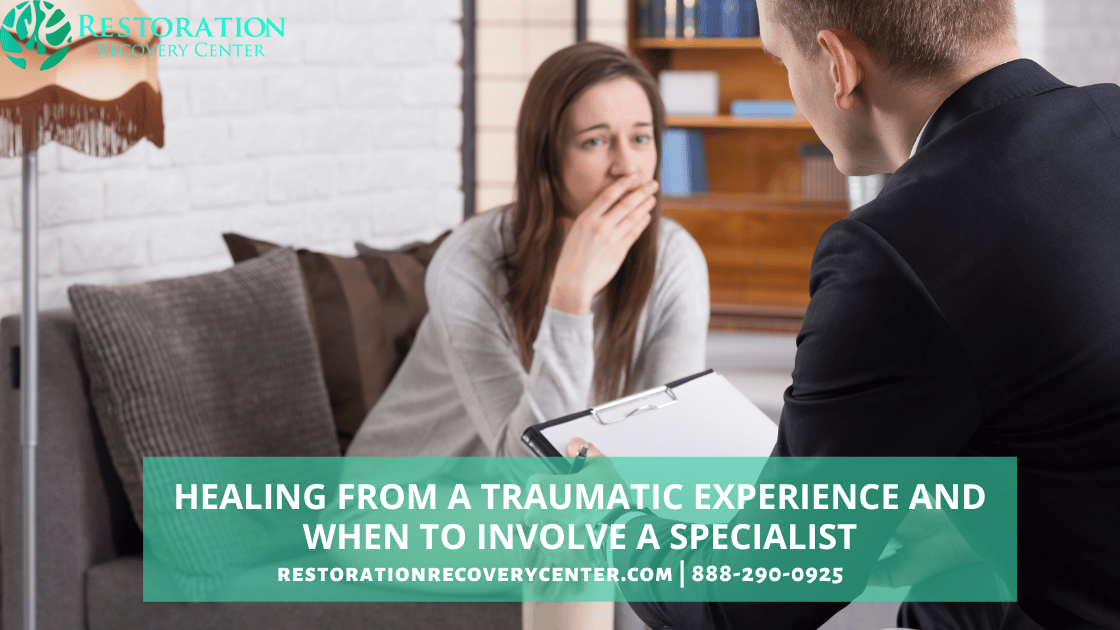Healing From A Traumatic Experience And When To Involve A Specialist
Learning about the stages of healing can be distressing, motivating, upsetting, or uplifting. No matter how you feel, your reaction is not wrong. Acknowledging your emotional response to the stages of healing can allow you to harness your emotions’ energy and reach out to a trained specialist.
When looking for a trauma specialist, it is vital to keep in mind that, regardless of what type of psychotherapy you pursue, your therapist should empower you and welcome you as a collaborator in the process of healing from a traumatic experience, not attempt to impose control over you.
Studies have found that individuals who are active participants in their therapy are more satisfied with the therapy. In addition, it is crucial that you feel safe in your therapeutic relationship.

healing from a traumatic experience
Diagnostic
To diagnose post-traumatic stress disorder, your doctor will likely:
– Perform a physical exam to check for medical problems that may be causing your symptoms
– Do a psychological evaluation that includes a discussion of your signs and symptoms and the event or events that led up to them
– Use the criteria in the Diagnostic and Statistical Manual of Mental Disorders (DSM-5), published by the American Psychiatric Association
Diagnosis of PTSD requires exposure to an event that involves the actual or possible threat of death, violence or serious injury. Your exposure can happen in one or more of these ways:
– You directly experienced the traumatic event
– You witnessed, in person, the traumatic event occurring to others
– You learned someone close to you experienced or was threatened by the traumatic event
– You are repeatedly exposed to graphic details of traumatic events (for example, if you are a first responder to the scene of traumatic events).
Below, let us look at a few examples of therapies used to help patients healing from a traumatic experience.
Cognitive Processing
CPT is a 12-week course of treatment, with weekly sessions of 60-90 minutes.
At first, you’ll talk about the traumatic event with your therapist and how your thoughts related to it have affected your life. Then you’ll write in detail about what happened. This process helps you examine how you think about your trauma and figure out new ways to live with it.
For example, maybe you’ve been blaming yourself for something. Your therapist will help you take into account all the things that were beyond your control, so you can move forward, understanding and accepting that, deep down, it wasn’t your fault, despite things you did or didn’t do.
Prolonged Exposure
Prolonged exposure is a specific type of cognitive behavioral trauma therapy in California that teaches individuals to gradually approach trauma-related memories, feelings and situations. By facing what has been avoided, a person presumably learns that the trauma-related memories and cues are not dangerous and do not need to be avoided.

healing from a traumatic experience
Typically provided over a period of about three months with weekly individual sessions at the Addiction Recovery Center in Auburn, California. Sixty- to 120-minute sessions are usually needed in order for the individual to engage in exposure and sufficiently process the experience.
EMDR
EMDR can also be used to treat patients healing from a traumatic experience .
It has been endorsed by the American Psychiatric Association and the International Society for Traumatic Stress Studies. In addition, it is used by the United States Department of Veterans Affairs, the Department of Defense and overseas organizations, including the United Kingdom Department of Health and the Israeli National Council for Mental Health.
According to the EMDR Research Foundation there are now over 30 gold standard studies documenting the effectiveness of EMDR therapy over the past 30 years with problems such as rape and sexual abuse, combat trauma, childhood trauma and neglect, life threatening accidents, and symptoms such as anxiety, depression, and substance abuse.
The Auburn Center for Addiction Recovery uses all of the above methods to help patients struggling with trauma related psychological issues. Feel free to visit us to refer your loved one to us, and they will surely get the help they need.






